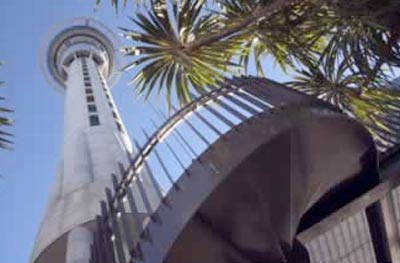(单词翻译:单击)
情景对话
Todd: So, Lucinda, in New Zealand, are you from Aukland?
托德:露辛达,你是来自新西兰奥克兰吗?
Lucinda: No, I'm actually from about four-hours drive north of Aukland.
露辛达:不是,我来自距离奥克兰以北四小时车程的地方。
Todd: Oh, you're north of Aukland.
托德:哦,所以你来自奥克兰北边。
Lucinda: Yeah, yeah.
露辛达:对,是的。
Todd: OK, and where are you from?
托德:好,那你来自哪里?
Lucinda: I'm from the Bay of Islands. That's actually a region in the North Island, actually northland, North Island.
露辛达:我来自岛屿湾。那里位于新西兰北岛。
Todd: OK, so did you grow up in a city or in the country?
托德:好,你是在城市长大的还是在乡村长大的?
Lucinda: In very, very, very country. (Oh really) Yeah the population of my town or region is about 100 people, between 100 and 200 people. I haven't been back, been there for awhile but yeah, about 100, 200 people.
露辛达:在非常非常乡村的地方。我家乡的人口只有100人,大概是100人到200人之间吧。我有一段时间没有回家乡了,我想人口大概是一二百人的样子。
Todd: Wow, what's it like growing up in the country?
托德:哇,在乡村长大是什么感觉?
Lucinda: It's very different. It's very different from living in the city and I can remember when I was a kid, I never had TV because we couldn't get reception for television or candy, anyhing that you really couldn't buy in bulk, cause my mother would go shopping I think once every two weeks and my mother is health fanatic so she basically chose all of the things myself and my brother ate and we really had no choice so we never really knew about, you know, junk food until we were quite older.
露辛达:非常与众不同。与生活在城市非常不同,我记得我小时候家里没有电视,因为我们那里收不到电视信号,而且买不到散装的糖果或其他食物,我记得当时我妈妈每两周去购物一次,她热衷于健康饮食,所以她会选择我和我哥哥的食物,而我们则没有选择,因为我们当时不知道还有垃圾食品,长大以后我们才知道。
Todd: Whoa, so did your mother grow her own food and her own vegetables and raise her own animals?
托德:哇,那你妈妈会自己种蔬菜,养动物吗?
Lucinda: Yeah, we didn't have animals because we were living on an estate which allowed for no animals, pet animals but we, my mother grows her own lettuce, herbs, things like that, yeah. Oh, we did have chickens. We had our own eggs, so yeah.
露辛达:会,我们没养动物,因为我们生活的那个地区不让养动物和宠物,我妈妈种了莴苣和草药之类的蔬菜。哦,我们有养鸡。所以我们吃的鸡蛋是自家鸡下的蛋。
Todd: OK, so but you said that you grew up in the country. This wasn't a farm?
托德:好,你说你是在乡村长大的。是农场吗?
Lucinda: No, no not a farm. My mother was raised on a farm but I was raised in, I guess we call it New Zealand, "the bush", it's like a forest.
露辛达:不是,不是农场。我妈妈是在农场长大的,不过我不是,我长大的地方新西兰称为“林区”,和森林差不多。
Todd: Oh, really.
托德:哦,真的吗?
Lucinda: But it's right by the ocean so it's very hard to explain. It's on a big mountain top and it's covered with bush with like, not really big trees, but
露辛达:那里毗邻海洋,很难解释。是在一座高山的山顶,周围都是灌木丛,没有高大的树木。
Todd: Small trees?
托德:是小树吗?
Lucinda: Yeah, and then some big trees but mainly small trees, and then there is a cliff face around the whole area. It's on like a point, and the cliff faces around the whole area and then water below, because it's islands, and a bunch of islands, so the islands are covered not with farmland but with bush.
露辛达:对,有一些高大的树木,不过主要是小乔木,那片地区四周都是悬崖壁。那个地方周围是悬崖壁,下面是水,因为那里是群岛,不过那里并不是农场,而是林区。
Todd: So when you have children, or if you have children some day, would you want them to grow up in a similar environment or in the suburbs or in the city?
托德:你以后有了孩子,会让他们在类似的环境成长吗?你希望他们在郊区成长还是在城市成长?
Lucinda: Oh, that's very hard. When they are young I would like them to grow up in that environment perhaps to the end of primary school but because of schooling problems, the best school's always in the cities and so unfortunately I had to travel by bus one hour each way and I was going to high school.
露辛达:哦,这很难选择。我希望自己的孩子在小学毕业以前在乡村环境成长,因为上学是个问题,最好的学校通常都在城市里,所以非常不幸地,我上高中时坐公交车要一个小时的时间。
Todd: Oh, that's a long way.
托德:哦,那是挺远的。
Lucinda: Yeah, and that's over a ferry, on a ferry as well, that's a boat that carries cars, and you have to travel, the bus had to go over on a boat.
露辛达:对,而且还要坐渡轮,是那种可以接载汽车的渡轮,所以当时我必须要乘坐公交然后再上渡轮。
Todd: Man, you had to take a bus and a boat to get to school.
托德:天哪,你上学要坐公交车和渡轮。
Lucinda: Yeah.
露辛达:对。
Todd: That's a commute.
托德:像通勤一样。

译文属可可原创,仅供学习交流使用,未经许可请勿转载
重点讲解
重点讲解:
1. be different from 有差别的;不同的;
例句:Public speaking is different from conversation.
演讲和日常说话是不同的。
2. in bulk 大宗,大批(买卖);
例句:Buying in bulk is more economical than shopping for small quantities.
批量采购要比零买实惠很多。
3. be covered with 用…遮盖;把…铺在…上;
例句:The hillsides are covered with ferns.
山坡上长满了蕨类植物。
4. a bunch of 大量;大批;
例句:There were a bunch of reasons why I couldn't go to the marathon on the weekend.
周末我不能去马拉松的原因很多。


